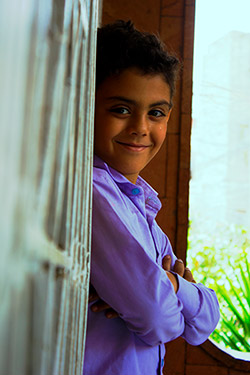 Anas is 9 years old and is suffering from thalassaemia. Anas is one of the patients being protected under the framework of the Emergency Health and Nutrition Project
Anas is 9 years old and is suffering from thalassaemia. Anas is one of the patients being protected under the framework of the Emergency Health and Nutrition Project
5 November 2019, Yemen – The World Health Organization (WHO) and the World Bank, through the Emergency Health and Nutrition Project (EHNP), are providing life-saving support to thalassemia patients in Yemen. In 2019, blood bags provided reached almost 45 000 bag, along with laboratory reagents critical to ensuring safe blood transfusions further strengthening the capacity at the blood transfusion centres across the country.
Globally, over 50 000 people are born each year with a severe form of thalassemia – a blood disorder causing the body to make an abnormal or inadequate amount of haemoglobin. The disorder results in large numbers of red blood cells being destroyed, which leads to anaemia. An estimated 80% of these cases occur in developing countries. In Yemen 700 new cases of thalassemia are diagnosed yearly, and 50 000 cases are on record so far according to association of thalassemia.
In Yemen, a country ravaged by war, the treatment of thalassemia is a rare but much needed miracle. This is why the support provided is essential. With regular blood transfusions needed by these patients, safe blood saves lives and improves health.
“The centre receives 60–70 patients suffering from of thalassemia and anemia every day. Once a case is examined, the patient is referred to the blood transfusion centre to receive a blood transfusion,” said Muktar Alkubati, manager of the Yemeni association for Thalassemia patients and genetic blood in Yemen.
Due to shortages in blood supplies, centres such as this one struggle to meet the demands for blood transfusions. The first victims to suffer were – and still are – vulnerable children with blood disorders, with many facing the prospect of death at an early age.
“Some children died and some did not; these diseases can cause very visible deformations. Adequate and immediate blood transfusions could have saved those children’s lives,” Dr Alkubati added.
Anas, a bright, 9-year-old boy in the third grade, is living with thalassemia and has benefited from the provision of support through the EHNP. He receives a blood bag every 3 weeks, and because of this, he is healthier and able to live life with a smile on his face.
About the Emergency Health and Nutrition Project (EHNP)
WHO with its technical partner the World Bank, under the Emergency Health and Nutrition Project (EHNP) are meeting health needs in Yemen. The EHNP is a cross-cutting response framework designed specifically to provide basic health and nutrition services to meet acute health needs, supporting the national system in the midst of war.
EHNP supports 72 hospitals across Yemen with a suite of essential life-saving health services, through the health service delivery mechanism known as the Minimum Service Package (MSP). WHO and the World Bank are also working with UNICEF to strengthen the referral system from the primary, secondary, to the tertiary levels of care. In addition, EHNP is supporting public health programmes and disease response to outbreaks such as cholera and diphtheria to name a few.


